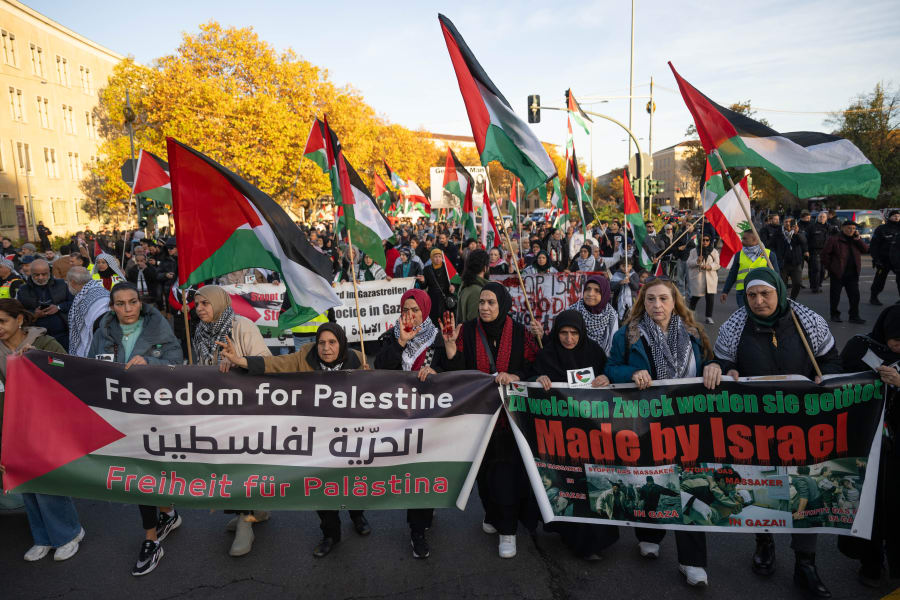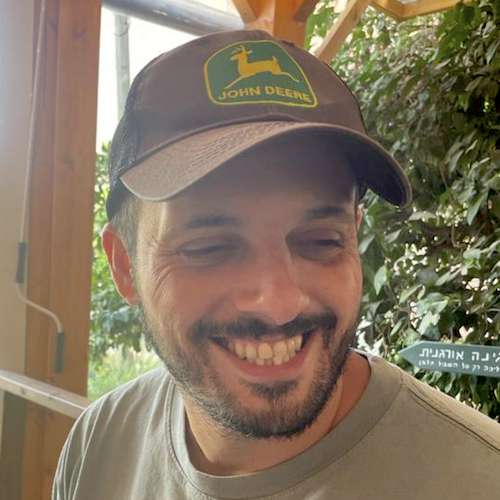God's hidden hand: How Europe is Israel's promised land no more

For over a decade, Israelis didn't just dream about building a life in Europe – they actively pursued it, with thousands moving to cities like Berlin. But Europe held an even broader allure for Israelis beyond permanent relocation: it was the ultimate vacation destination, a source of pride and excitement. Israelis would save for months just to stroll down Las Ramblas in Barcelona, posing triumphantly in front of London's Big Ben, or – in what was often considered the ultimate prize – attend a live match of their favorite European soccer team. These trips were badges of honor, fodder for envious friends back home, and represented participation in a cosmopolitan world that seemed increasingly accessible. How those mighty dreams have fallen.
The German capital, in particular, became a beacon for young Israeli professionals, artists and entrepreneurs seeking a different kind of life. The appeal was multifaceted: An escape from the constant shadow of conflict, significantly lower living costs, and most importantly, the promise of a truly meritocratic society where professional skills and personal qualities mattered more than ethnic or religious background.
The "Berlin Dream" represented more than just economic opportunity. For many Israelis, it offered a chance to shed the weight of regional tensions and religious politics that often dominate life in Israel. They were drawn to the cosmopolitan atmosphere of European capitals, where one could blend into a diverse tapestry of cultures and be judged primarily on individual merit. Lower taxes, affordable housing, and the absence of mandatory military service added practical appeal to this vision of a more relaxed, secular lifestyle. They saw themselves as pioneers of a new era, never suspecting they were witnessing its apparent twilight.
The nightmare emerges
The November 2024 attacks on Maccabi Tel Aviv soccer fans in Amsterdam serve as a stark illustration of the growing concerns many Israelis face when considering not just relocation, but even brief visits to Europe. The incident, which saw organized groups of radical Islamists hunting down Jewish visitors in the streets, marks a frightening escalation in antisemitic violence. These attacks weren't spontaneous outbursts but rather coordinated actions, reflecting a deeper crisis in European cities where radical Islamic elements, often emerging from immigrant communities, have grown increasingly bold in targeting Jews.
The irony is devastating: in Amsterdam, the very city where Anne Frank once hid from Nazi persecution, Jews are once again seeking shelter from violent antisemitism. The fact that in 2024, Jewish visitors require police protection to visit the Anne Frank House - a memorial to the Holocaust – represents a chilling full-circle moment that few could have imagined possible in modern Europe. As one commentator noted, when a Jew or Israeli must hide their identity in Amsterdam, it becomes painfully clear that Europe has neither learned nor truly forgotten its dark past.
A pattern of violence
According to a comprehensive 2023 survey by the European Union Agency for Fundamental Rights (FRA), the scope of antisemitism in Europe has reached alarming levels. Their findings reveal that 96% of Jews across 13 EU countries report encountering antisemitism in their daily lives, with 80% believing the situation has worsened in recent years.
The statistics paint a grim picture: more than a quarter of Jewish respondents experienced antisemitic harassment within a single year, while 7% faced physical attacks or threats over five years. The situation has become so dire that in countries like Belgium, France, and Hungary, between 40-50% of Jewish respondents have considered emigrating due to safety concerns. These aren't just numbers – they represent thousands of Jewish families facing daily threats and contemplating leaving their homes behind.
The reality behind the statistics
The root cause is impossible to ignore: many Muslim immigrants arrive in Europe carrying deep-seated antisemitic beliefs from their countries of origin, where hatred of Jews is often systematically taught and culturally ingrained. The notion that such deeply held convictions would simply disappear upon reaching European soil has proven dangerously naïve.
As demonstrated in cities across Europe, these attitudes often intensify rather than diminish, particularly when reinforced by radical imams and mosques funded by entities like Qatar, which also supports Hamas. The same antisemitic ideology that drives violence in the Middle East is being transplanted into European cities, where it finds new expression in attacks on local Jewish communities.
Life on the ground: A Swedish warning
The experience of R. (name changed for safety), a 41-year-old Israeli-Jewish believer in Yeshua (Jesus) who immigrated to Gothenburg, Sweden's second-largest city, illustrates this stark reality. Following official recommendations from the city itself, R. now conceals his Jewish and Israeli identity, avoiding any identifying symbols or objects.
"The situation was deteriorating well before October 7," he explains, describing a transformed Sweden where demographic changes have created "no-go zones" where even police hesitate to enter, and where migrant gang violence, including murder, has become a daily reality – with Jews often targeted specifically.
A particularly chilling incident occurred when R. participated in an Israel Independence Day commemoration in the city center, organized by a Christian group. "About 500 Muslims gathered around, screaming threats," he recounts. But what alarmed him even more than the direct threats was the police response - or lack thereof.
"They seemed more concerned about potential 'Islamophobia' and avoiding hurt feelings than protecting Jews under threat," he observes. This prioritization of political sensitivities over Jewish safety has become a common theme across Europe.
Asked if he's considering returning to Israel, R. admits to "contemplating on going back to the land (Israel), driven by a desire to live somewhere without hostility and threat. The trend shows it's only going to get worse here."
Looking back, looking forward
What was once seen as a welcoming destination has become, for many, a source of deep anxiety. The Islamic ideology among some immigrant communities, coupled with what many see as a reluctance by European authorities to confront this head-on, has transformed the landscape of Jewish life in Europe. Once viewed as opportunities for cultural engagement, public spaces and events are increasingly perceived as potential risks.
The situation has become so severe that many Israelis now think twice about speaking Hebrew in public or displaying any visible signs of their Israeli or Jewish identity. Even visiting the Anne Frank House in Amsterdam now requires police protection for visibly Jewish or Israeli visitors – a painful irony that hasn't been lost on those watching Europe's changing landscape.
The European dream, for many Israelis, involved not just physical relocation but the hope of participating in a multicultural society where their Jewish and Israeli identities could coexist with European culture.
The reality has proven far more challenging. In Amsterdam, a city once celebrated for its tolerance, demographics tell a sobering story: the Dutch population has declined to 44%, while the city hosts growing immigrant communities, including approximately 80,000 Moroccan immigrants.
The recent pogrom-like attacks on Israeli soccer fans highlighted the severity of the situation, with organized groups targeting Jews and Israelis in what local authorities initially seemed reluctant to address fully. Most of those detained were quickly released, reflecting what some see as a broader pattern of European authorities' hesitation to confront antisemitic violence decisively.
Chosen?
In "Fiddler on the Roof," Tevye famously pleaded with God: "I know, I know. We are Your chosen people. But, once in a while, can't You choose someone else?" His words echo across time to today's Europe, where Jews once again find themselves marked by this ancient chosenness - not in the ghettos of Eastern Europe this time, but in the supposedly enlightened capitals of the West.
The ancient prophecies speak directly to this moment: "I will take you from the nations and gather you from all the countries and bring you into your own land," declares Ezekiel 36:24. Isaiah 11:12 similarly foretells how God "will assemble the banished of Israel, and gather the dispersed of Judah from the four corners of the earth."
Even the current tensions over Israel's land were prophesied in Joel 3:2, which speaks of God entering into judgment with nations that "have scattered them among the nations and have divided up my land."
R.'s story, like many other stories of Jewish people today, carries haunting echoes of Jewish life in Europe a century ago. Then, as now, Jews found unprecedented acceptance in European society – they became doctors, lawyers, artists, and fully integrated citizens who believed they had finally found their place in the European story.
Then too, this period of acceptance proved tragically brief. The shift from integration to persecution was swift and devastating, culminating in the Holocaust. Today's Jews in Europe find themselves in an eerily similar position – once again watching as initial welcome turns to warning signs, then to open hostility. The difference is that this time, they have somewhere to go.
Europe was once the ‘Mecca’ for many Israelis – a phrase that now turns bitterly on its head. The continent that represented freedom, opportunity, and cosmopolitan dreams has become, for many Jews, a place to flee from rather than to.
Perhaps, as the ancient prophecies suggest, it is God Himself who is working behind the scenes, turning His people's gaze away from the falsehoods of the Meccas and back toward Jerusalem, their true eternal home.

Tolik is a Middle East analyst and media professional with extensive experience in covering regional geopolitical developments. His background spans analytical journalism, media production, and strategic communications, having contributed to major Israeli and international television networks and newspapers.
You might also like to read this:















